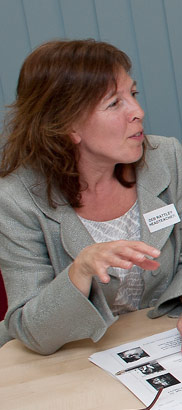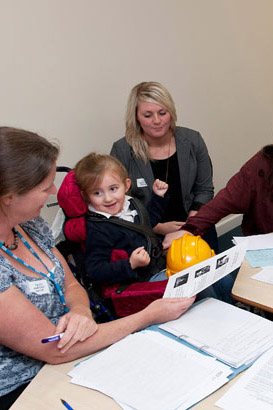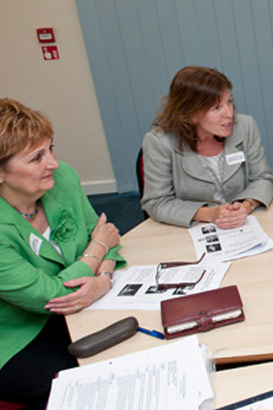An effective flow of information is essential to collective understanding and collaborative responses. It relies, in part, on shared meanings of words, but we know from our own experience that the field of special education is full of acronyms and jargon. Terminology in everyday use may be more specific in meaning when used in an 'expert' capacity.
The word 'spectrum' is an example. In everyday language it refers to the continuum of wavelengths of colour as seen in rainbows and oil on water. In SEN is it a recognised term to illustrate the graduated severity of a disorder or syndrome.
Spend some time considering the jargon you use. Make a list of words which you use regularly but which others may not easily understand.
What are the implications of using jargon when talking to parents, for example?
Consider, for example, how you would explain Foetal Alcohol Syndrome to a social worker without using jargon.

Managers and leaders are expected to be aware of how they need to modify the language they use with different audiences. Are you?
Imagine a situation in school where something has gone wrong and it is up to you to solve it. Imagine how you would explain the situation in a few sentences first to an expert and then to a parent. Can you see your own differentiation in delivery of your explanation? How is your choice of expression important in management? Have you considered using statistics, charts and pictures to improve your multi-professional communication skills?

By virtue of 'specialising', an expert's may gain in depth professional knowledge at the expense of other relevant knowledge, eg about education law and expectations.
Think of differences between medical consultants, social scientists and psychologists for example. Consider the overlap in their expertise. What similarities might there be in the knowledge and terminology they use professionally? What differences might there be? What gaps in knowledge might they have to do with children who have learning difficulties or CLDD? What are the implications of these points?

The Common Assessment Framework introduced the role of Lead Professional. This role is central to the 'joined up' working of multi-agency support for children. The Lead Professional is allocated according to the role of the person within the 'web' of professional involvement, and is not based on professional discipline or status. The Lead Professional is often looked upon to facilitate the collaborative working of professionals.
Make a skills list for the Lead Professional role and then click on the button to reveal some of the important tasks of the Lead Professional.
Some suggestions
- Collating information to make the bigger picture
- Interpreting report information
- Prioritising the 'need to know' – what and when
- Identifying 'who' needs to know
- Organising effective presentation of material to make greatest impact on those who need to know
- Finding methods of making important points available for staff yet retaining privacy and discretion for the individuals
- Advocacy to ensure each role gets to be heard
- Recognising intersubjectivity to develop mutual representations of the subject. Individual viewpoints may be different, but all involved understand the interpretation of others.
Return